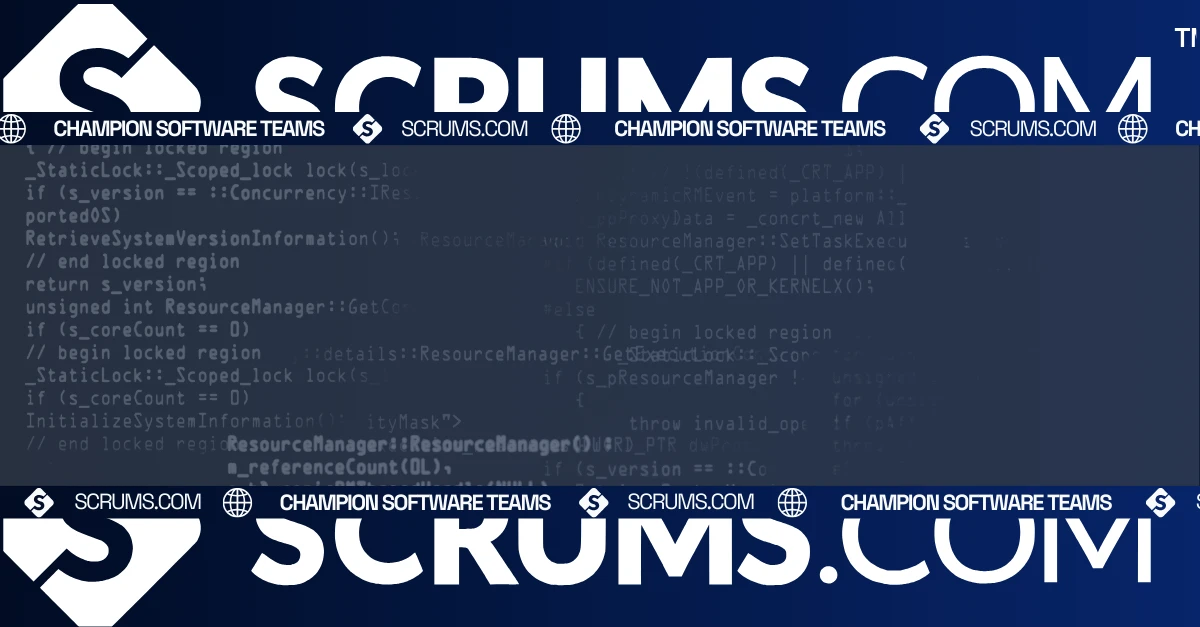Hire XML software developers
Scrums.com's 10,000+ software developer talent pool includes experts across a wide array of software development languages and technologies giving your business the ability to hire in as little as 21-days.







































Years of Service
Client Renewal Rate
Vetted Developers
Ave. Onboarding
Africa Advantage
Access world-class developers at 40-60% cost savings without compromising quality. Our 10,000+ talent pool across Africa delivers enterprise-grade engineering with timezone overlap for US, UK, and EMEA markets.
AI-Enabled Teams
Every developer works within our AI-powered SEOP ecosystem, delivering 30-40% higher velocity than traditional teams. Our AI Agent Gateway provides automated QA, code reviews, and delivery insights.
Platform-First Delivery
Get real-time development visibility into every sprint through our Software Engineering Orchestration Platform (SEOP). Track velocity, blockers, and delivery health with executive dashboards.
Align
Tell us your needs
Book a free consultation to discuss your project requirements, technical stack, and team culture.
Review
We match talent to your culture
Our team identifies pre-vetted developers who match your technical needs and team culture.
Meet
Interview your developers
Meet your matched developers through video interviews. Assess technical skills and cultural fit.
Kick-Off
Start within 21 days
Developers onboard to SEOP platform and integrate with your tools. Your first sprint begins.
Don't Just Take Our Word for It
Hear from some of our amazing customers who are building with Scrums.com Teams.
Flexible Hiring Options for Every Need
Whether you need to fill developer skill gaps, scale a full development team, or outsource delivery entirely, we have a model that fits.
Augment Your Team
Embed individual developers or small specialist teams into your existing organization. You manage the work, we provide the talent.
Dedicated Team
Get a complete, self-managed team including developers, QA, and project management – all orchestrated through our SEOP platform.
Product Development
From discovery to deployment, we build your entire product. Outcome-focused delivery with design, development, testing, and deployment included.
Access Talent Through The Scrums.com Platform
When you sign-up to Scrums.com, you gain access to our Software Engineering Orchestration Platform (SEOP), the foundation for all talent hiring services.
View developer profiles, CVs, and portfolios in real-time
Activate Staff Augmentation or Dedicated Teams directly through your workspace

Need Software Developers Fast?
Deploy vetted developers in 21 days.
Tell us your needs and we'll match you with the right talent.
What is XML and Why It Matters for Your Business
XML (Extensible Markup Language) is a widely used data format designed for storing and transporting structured data across systems. It serves as the backbone for numerous technologies that facilitate data sharing, integration, and management. XML is essential for industries that rely on complex data structures, ranging from web services to enterprise applications and document management systems. According to W3Techs, XML remains one of the top formats used for data exchange, especially in enterprise-level solutions.
Hiring an XML developer is crucial for businesses needing seamless data integration, efficient document management, and reliable data transformation processes. With the increasing demand for interoperability across platforms, XML developers can help streamline your data-driven operations.
Key Benefits of Hiring an XML Developer
Hiring an XML developer provides a wide range of benefits, particularly for businesses involved in data management, system integration, and web services. Key advantages include:
- Data Integration Across Systems: XML is often used as a standard format for integrating data across disparate systems, such as databases, web services, and applications. XML developers can help you build scalable systems that facilitate data exchange between various platforms, ensuring smooth operations.
- Document Management Systems: Many organizations rely on XML for document management systems (DMS) that store, organize, and retrieve critical business documents. An XML developer can implement efficient DMS solutions, enabling businesses to manage large volumes of documents effectively.
- Custom Web Services: XML is used in many web services for transmitting data between servers and clients. XML developers can design custom web services that leverage XML to ensure reliable communication and data exchange between your applications and third-party services.
- Data Exchange and Transformation: XML is a popular format for data exchange due to its flexibility and compatibility across systems. XML developers can implement custom solutions for data transformation, enabling you to convert data between different formats to meet various business needs.
- Enterprise Application Integration (EAI): XML developers can help integrate enterprise-level applications by enabling seamless data flow between systems, reducing silos, and improving efficiency across business processes. This is essential for industries such as finance, healthcare, and logistics.
Core Competencies of a Skilled XML Developer
When hiring an XML developer, it’s important to ensure they possess the necessary skills and expertise to handle complex data integration, document management, and web services projects. Key competencies include:
- Proficiency in XML and Related Technologies: A skilled XML developer should have an in-depth understanding of XML syntax, schemas (XSD), and related technologies such as XSLT (Extensible Stylesheet Language Transformations), XPath, and XQuery. These are essential for working with XML data and performing transformations.
- Experience with Data Integration: XML developers should have experience in integrating data across different systems using XML. This includes working with APIs, web services, and databases, ensuring seamless data exchange between platforms.
- Knowledge of Document Management Systems: A good XML developer should be experienced in building or maintaining document management systems that rely on XML for organizing, storing, and retrieving documents. This is critical for industries that need to manage large volumes of business documents efficiently.
- Custom Web Services Development: XML developers should be proficient in designing web services using XML for data communication between applications. Familiarity with protocols like SOAP (Simple Object Access Protocol) and RESTful web services is essential.
- XML Data Transformation Skills: A competent XML developer should be skilled in data transformation using XSLT, ensuring data can be converted between different formats and structures. This is important for businesses that need to repurpose or reformat data for different systems.
How XML is Used in Modern Software Development
Despite the emergence of newer data formats like JSON, XML remains an essential technology in many sectors of modern software development. Here are some common applications of XML in today’s development landscape:
- Enterprise Data Integration: XML is frequently used to facilitate data integration between enterprise systems, such as CRMs, ERPs, and financial platforms. XML developers help create standardized data formats that allow different systems to communicate effectively, reducing data silos and improving organizational efficiency.
- Document Management and Publishing: Many document management systems rely on XML for storing and organizing documents in a structured format. XML is also widely used in industries like publishing and legal, where documents need to follow strict standards for layout, structure, and data accuracy.
- Custom Web Services and APIs: XML plays a central role in web services, particularly in SOAP-based APIs, where structured data needs to be transmitted between clients and servers. XML developers build APIs that facilitate secure, reliable communication between applications.
- Data Exchange in E-Commerce and Logistics: XML is often used in e-commerce platforms and logistics systems for data exchange between suppliers, customers, and business partners. This includes order processing, inventory management, and shipping logistics, where XML ensures consistent data formatting across different systems.
- Configuration and Metadata Storage: XML is used to store configuration settings and metadata in many applications, allowing developers to define system behaviors, application settings, and user preferences in a standard format.
XML vs. Other Data Formats: When to Choose XML for Your Project
Choosing the right data format for your project is essential for efficient system performance and scalability. Here’s how XML compares to other formats like JSON and CSV, and when you might choose XML:
- Complex Data Structures: While JSON is preferred for simpler, lightweight data exchange, XML is better suited for projects that require more complex, hierarchical data structures. XML’s ability to handle metadata and attributes gives it an advantage in cases where additional data description is needed.
- Interoperability Across Systems: XML is a mature technology with strong support across multiple platforms, making it the preferred choice for legacy systems and enterprise applications. Unlike CSV, which is limited to flat data structures, XML allows for rich data descriptions and is more versatile for enterprise data integration.
- Document-Centric Applications: XML is the standard for document-centric applications where data and structure need to be tightly linked, such as in publishing, legal, and healthcare industries. JSON and CSV don’t offer the same level of document structuring capabilities.
- Transformation and Flexibility: XML’s support for XSLT and XPath allows developers to easily transform data from one format to another. This flexibility makes XML an excellent choice for businesses that need to exchange and manipulate data across different formats.
- Enterprise-Level Applications: For industries like finance, healthcare, and government, where strict data standards and interoperability are required, XML remains the go-to choice over JSON or CSV. Its long-standing use in these industries ensures compatibility with a wide range of enterprise systems.
The Future of XML Development: Trends and Insights
Despite the rise of newer data formats, XML continues to be a critical technology in enterprise systems, document management, and data exchange. Here are some trends highlighting the ongoing relevance of XML development:
- Increased Use in Enterprise Application Integration (EAI): XML remains a vital tool for integrating enterprise-level applications, especially as businesses continue to use legacy systems that require XML-based communication. XML developers are crucial for building bridges between old and new systems.
- Document Management Systems (DMS) Growth: As organizations manage increasing volumes of digital documents, the demand for XML in document management systems is expected to grow. XML developers will continue to play a key role in optimizing document storage, retrieval, and processing.
- Advancements in XML Tools and Libraries: Modern XML tools and libraries are becoming more efficient, making XML easier to use in conjunction with other technologies like JSON and RESTful APIs. XML developers are increasingly able to integrate XML with more lightweight formats in hybrid applications.
- XML in Cloud and API Development: With the rise of cloud-based platforms, XML continues to be relevant for SOAP-based APIs and other cloud-native applications. As businesses move to hybrid cloud environments, XML developers will play a crucial role in ensuring secure, reliable data exchange.
- Compliance and Standardization: XML’s role in industries that require strict data standardization, such as healthcare and finance, will continue to grow. XML’s structured approach ensures compliance with regulatory standards like HL7 (for healthcare) and ACORD (for insurance).
How to Hire the Right XML Developer for Your Needs
Hiring the right XML developer is essential for the success of your data integration, document management, or web services project. Here’s how to get started:
- Define Your Project Requirements: Clearly outline your project’s scope, including whether you need expertise in data integration, document management systems, or web services. This will help you identify developers with the right skills.
- Look for Relevant Experience: Choose developers with proven experience in XML development, particularly those who have worked on enterprise data integration, document management, or custom web services projects. Experience with related technologies like XSLT and XPath is highly valuable.
- Evaluate Technical Skills: Ensure the developer has strong skills in XML syntax, data transformation, and integration. They should be familiar with technologies like SOAP, RESTful services, and APIs, ensuring that your system can communicate effectively with other platforms.
- Assess Communication and Collaboration: Your XML developer should be able to collaborate effectively with your team and communicate technical concepts clearly, especially when working on complex data integration projects.
- Consider Freelancers or Development Agencies: Depending on the complexity of your project, you may opt to hire a freelance XML developer or work with a development agency specializing in data integration and web services. Each option offers unique advantages, so choose based on your needs and budget.
Find Related Software Developer Technologies
.NET Core developers
C developers
Terraform developers
Typescript Developers
Zend developers
Shell software developers
PHP Developers
Explore Software Development Blogs
The most recent trends and insights to expand your software development knowledge.
















